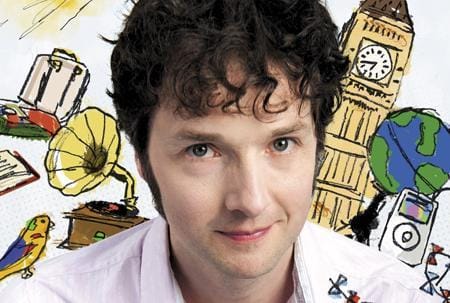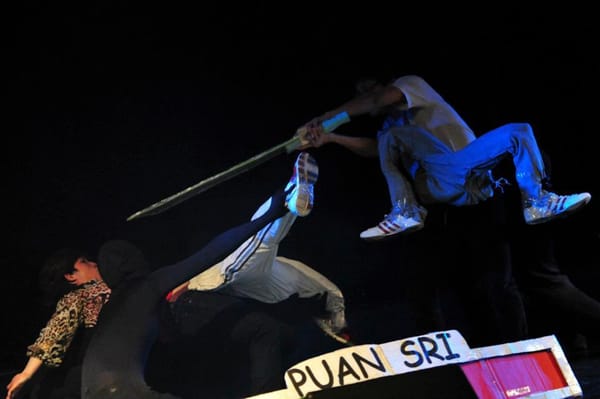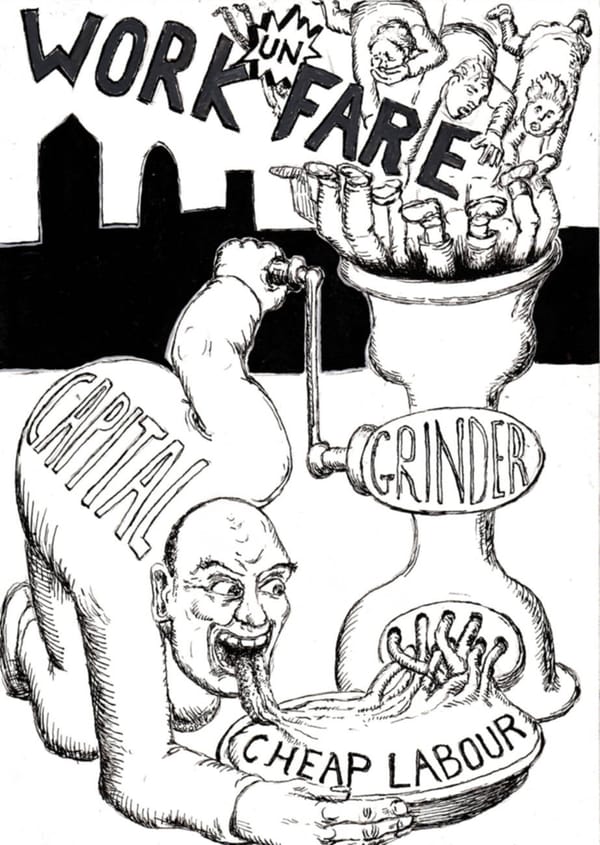In The Thick of It with Chris Addison as he keeps us In the Loop
Tim Arbabzadah goes on pun overload as he asks the stand-up comedian/actor about everything from his university days to his ongoing tour

Tim: First off, I apologise if I ask any questions that you’ve been asked before... Chris: Well, it’s kind of difficult not to do that. It’s the nature of interviews. I once did a proper press junket day where you’d stay in a room and people come in every five minutes and it’s fucking weird – you think you’re going out of your mind. So don’t worry about it, it can’t be as bad as that.
T: Let’s start with The Thick of It. Ollie, the character you play, what I always think about him is that he’s actually quite a horrible person. He does some really unlikeable things but he’s very likeable and I think that’s kind of a testament to you and your acting the fact that you’ve made this character who is not very likeable on the face of it be an actual quite likeable character – what’s your take on that? C: I think the reason Ollie is likeable – here’s the thing – Toby, his counterpart in In the Loop is rather less likeable than Ollie. Toby’s a proper shit. And Ollie... yeah Ollie does some fairly unlikable things, as do all the characters, but if there’s anything that makes him likeable is the fact that he’s so spectacularly incompetent and he’s a bit downtrodden in a way. You know he’s at the bottom of the pile and because he’s at the bottom of the pile you automatically feel slightly sorry for him and I think that feels a little bit like liking him.
T: That’s true, he is incompetent, and in fact that leads me quite well onto my next point. An American remake was made and it failed – do you think that this should work well in America or do you think that they like programmes where people are more like well-oiled machines? C: Well I know it works over there because we made [In the Loop] as a sort-of cousin to The Thick of It. It was released in America and did well in America and it was nominated for an Oscar. The American pilot for ABC was terrible – it had really, really good people involved in it but it was terrible. But Armando Iannucci and one of the writers Simon Blackwell created a show for HBO which starts in April called Veep which is very much in the style of The Thick of It but with Americans. It has Julia Louis-Dreyfus as the Vice President of America set in her office. So you can definitely do it in America, they absolutely love it. Well, the blue states love it. The red states? Eh… not so much.
T: I like to compare the show to The West Wing, where everyone has these great speeches and everyone’s really good at their jobs, whereas in The Thick of It everyone’s a little bit less good... C: Well yeah, there’s room for both of those things, one of the things about The West Wing is that it’s a very hopeful show – it’s very positive about the power of politics to do good and that doesn’t really turn up in The Thick of It. The Thick of It is not cynical about politics, it definitely isn’t, but what you have to remember is that The Thick of It is a workplace sitcom. If you take the politics out of The Thick of It – which might seem like an odd thing to do, but actually you should try this – you realise that actually you’re just dealing with a classic British workplace sitcom where a bunch of people who don’t really get on are thrown together in the same place and put under immense pressure and then we see what happens to them in that situation. The politics is the ‘sit’. It could have been some people in a conference centre, or a mechanics workshop, or a bakers, or anything, but it happens to be in the world of politics. With The West Wing it’s much more actually about politics and its machinations and it’s also a soap about the characters so you need more emotional juice out of it.
T: Can I now go back a little bit in time? Not literally, obviously… C:Well the answer to that is, no, you can’t. Literally, no, but figuratively, give it a go.
T: After university, did you go straight into comedy? C: I went into comedy about a year after I graduated. What they don’t tell you, what nobody ever tells you and what you’re not particularly going to thank me for telling you (although it’s probably best that I do) is that the year after university is one of the worst years of your life. Unless you’re on a vocational course like medicine where things sort of meld into your career, the year after university is bleak and difficult because it’s a big, big, big jolt. You’ve had 14 or 15 years of formal education, you’ve been in the place where all your friends are, you’ve had roughly the same hours. If you want to do stuff at the union, there are a billion things you can do there with like-minded people. But the minute you throw your mortarboard up into the air it’s over. It’s over. The door is locked and bolted behind you and there’s no way back in.
The minute you throw your mortarboard up in the air it’s over
It’s extremely depressing, and in that year I became really bleakly depressed. I had done a lot of drama and so on – not acting – but directing a lot of plays as that was the thing I wanted to go on and do and it’s really easy at university. If you’re doing a student production it’s a cheaper licence but if you’re trying to do it out in the real world it’s fucking hard. You need to earn money while doing it, you need to find people who want to do it; it’s a really, really hard thing to do. In the end I needed some kind of creative outlet and stand-up is the easiest one. If you have no other skills, if you’re not musical particularly or you can’t draw or you know all of those sort of things… stand-up. It’s dead easy. You just pitch up, somebody else sorts the lights, the room and the advertising. You just need to come up with some words – that’s all you have to do. So that’s why I tried it really. I’d never planned it. I certainly didn’t do anything like it at university – I wasn’t in a revue or anything.
T: I can imagine what my parents’ reaction would be if I told them I wanted to be a stand-up comic. It would be something along the lines of, “yeah, no, that’s really funny but can you actually do a real job at some point?” Were your parents OK with it? C: Yeah, they’ve always been tremendously supportive. I think that once it eventually – quite a long way down the line – became clear that I was going to be alright they relaxed and really enjoyed it but they’ve always been tremendously supportive. When I set out I gave myself five years and said, “if in five years this is clearly going nowhere, I need to rethink and, I dunno, I’ll retrain and do something else,” but, fortunately for me, five years down the line things were going pretty well. I sort of realised that I’d been doing it for five years and thought, “Oh yeah, was this the point where I was going to take stock?” Probably I would’ve told my parents something like that and then that might have given them a bit more hope. Parents just want you secure. They want you safe and they want you secure – that’s their main thing. I think all parents out of everybody worry about their children’s career choices whether they’re as outlandish or as silly as mine.
T: Back to The Thick of It – I’ve seen you said in interviews that people seem to have this sort of idea that you’re now a political commentator. Do you ever find that weird, sitting on the couch of The Andrew Marr Show thinking, “what am I doing here?” C: Well the Andrew Marr thing is interesting, because it’s a paper review. It has two functions: one is, it reviews the papers, that’s the obvious one. The other one is that it reveals a bit of the personality of the people who are reviewing the papers. It’s a little like a cross between an interview and commentary. Sometimes I have to go in and talk about things that I haven’t actually got a direct relationship with, but I’ve always said no to doing Question Time. I used to think, “oh, what’s a comedian doing on Question Time?” but if it’s somebody doing it well, it’s really good. If you watch Armando [Iannucci] when he’s does it it’s really interesting because he plays the part of the bewildered public and that’s a really good role to have. That’s not actually being a political commentator but being like a conduit for people wanting to call bullshit.
T: Like being an everyman character… C: Yeah! Exactly. That’s it. So yeah, I don’t comment on politics. You know, it’s in my stand-up show, you know there’s some political stuff, there’s some personal stuff, some political bullshit and a lot of fucking about but I’m not a crusader or anything like that. I enjoy politics, I enjoy the game aspect of politics – which is the bit that’s most harmful actually! I do comment on people, if I’m around during Question Time I will tweet through it but, you know, I’m not Andrew Lansley. I would never claim to have knowledge above anybody else’s of the press. People who famously play doctors or vets often get asked questions about health...
T: And you famously play a special adviser... C: …so I must get asked about politics, yeah!
Occasionally you have real ‘you are here’ moments in life
T: I really should ask about your stand-up because you are a stand-up comedian and I’ve been very careful to make sure that you know that I know that you’re not an actor – you’re a stand-up comedian and an actor. So your stand-up show, this year it hasn’t got a theme has it. C: No, that was deliberately chosen because I used to write shows that were very heavily themed and that was deliberate. Well, obviously it’s very hard to accidentally write something and say it has a theme – but it was deliberate in that I would take it up to Edinburgh. There are a gazillion comics in Edinburgh and you need to do something to stand out. That’s why I did those shows and when I came back to stand-up after a few years of enforced absence I wanted to have a show that was just straight stand-up really and very talky because I just wanted to get back to the roots of it. I thoroughly enjoyed it, so for the last two shows I’ve avoided doing a theme.
T: You’ve worked extensively in radio. Is that a medium that you personally enjoy or is it about the different challenges? It’s just about the sounds rather than the visual aspect after all. C: Well, my first love of comedy came from the radio. When I was a kid, about 11 or 12, on every sunday at 12:27pm Radio 4 used to repeat a classic radio series like The Goon Show, I’m Sorry, I’ll Read That Again, Round the Horne and all those proper mid-twentieth century classic radio shows. That’s one of the first places that I found kind of ‘my comedy’. I was brought up on radio comedy really and it’s always seemed a natural thing to me.
Eventually I got my own series The Ape That Got Lucky in 2005. The first day that we did the actual show and there were four microphones standing there and the four of us in the cast there, each with our scripts, standing back and forth at the microphones waiting for our turn to speak, it sounds genuinely exciting. You know, I’ve seen pictures of the Goons doing this and this is what I’ve loved for years. When I was maybe 16, what I really wanted to do was to go into radio. I listened religiously to what was then Manchester’s Piccadilly Radio, it’s changed now, but there was a guy on there, James H. Reeve. He used to forecast this call-in show between 10 and 1 and I’ve never heard anyone like him. He was urbane and funny and dry and it was an amazing show and I really wanted to do that so when I came to do the 5 Live satirical show that was great, I felt like I’d done both of the kinds of radio that I’ve always loved so, yeah, I really like it and I’d like to do more of it really.
T: Was that one of those tingly, almost out of body experiences where you’re almost looking at yourself doing something and you’re like, “Oh my god, I’m actually doing this, this is happening”? C: Yeah, I think so on both of those occasions. For the Radio 4 shows that we recorded, it was so exciting, but in both cases it was the microphones. It was what the microphone looked like, where it was positioned and stuff. You know, sitting in the 5 Live studio, which weirdly, was the 5 Live studio that they used in The Thick of It…
T: Oh really, for the episode with the Richard Bacon interview? C: Yeah, which was charming and weird. But you know, occasionally you have a real ‘you are here’ moments in life. They’re exciting, and both of those occasions were one.
T: Was it intimidating and perhaps a bit scary to come into something so established and so big as Mock the Week and suddenly being the new ‘regular guy’ – did you feel that pressure? C: The thing is it wasn’t that sudden. I’d done Mock the Week about 11 times before I became a regular. I was on a lot for the three series previous to becoming fully paid up so all it felt like was a step up in commitment. When I initially did it, I thought it would be terrifying to the point that I went and saw it recorded the week before. My experience of big panel shows and things like that has always been that after the first one you do of any particular panel show you come away going “ah yeah, yeah, I get that now, I know how that works” and I wanted to find that as far as I could so I went to the recording a week before so I had more of an idea of how the show worked on the night. I’d also spent years saying “no no no, I’m not going to do Mock the Week” out of fear really. I finally sort of bit the bullet and did it and absolutely loved it. I’ve always really, really enjoyed doing it, and I was quite surprised by that at the beginning which is why i think they kept having me back, because I was enjoying myself. When they finally said “do you want to come and do this full time” it wasn’t such a big leap.
T: Now that you’re a full regular, do you feel that with the younger comedians and the guys who come on for the first time, that you’re trying to help them out, trying to not cut them off, and trying to make sure that they get to showcase what they want to showcase? C: I think Mock the Week has had a reputation for quite a long time of being a real bear pit where people would leap over each other’s jokes and all of that kind of thing. You could see that I think, but I don’t think it’s like that now. I think it’s very different and I think there’s a lot more space given to people. Dara [O’Briain] is extremely good because he plays the part of the traffic policeman in the centre of it all, which you don’t see so much of in the edit, but because he’s the host as well as introducing the show on camera it’s kind of his job to ensure that everybody gets a say and he can kind of stop you and bring somebody in if you’re getting too garrulous or overexcited. So yeah, people get their chance definitely. You have to sort of step up I think once you’ve been given the chance, which can sometimes be a bit intimidating and scary, but it’s a much nicer and much more collaborative show than its reputation once would have had you believe.
T: Thank you very much, it’s been amazing talking to you. C: Thanks, it’s been nice to talk to you too – good luck with that year after the end of your studies!
T: I’ll now look forward to despondence!








